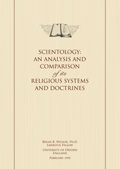V.I. Contemporary Religion and Changing Social Functions
Turning from the concrete elements derived from the traditional but apparently outmoded Christian conception of what might constitute a religion, we may briefly refer to the characteristics of religion emphasized in the non-normative sociological studies of the subject. Whilst not ignoring the importance of the substantive concern with the supernatural (or superempirical), social scientists emphasize the functions which religions fulfil. A religion creates, reinforces, or promotes social solidarity in the group and provides that group with a sense of identity. It provides, in the words of Peter Berger, “a humanly constructed universe of meaning,” which becomes an intellectual and moral framework in the light of which ideas and actions can be judged. If religion necessarily abandons—in the face of the development of science—specific theories of creation and cosmology, it continues to offer explanation of what purposes inhere in the universe and in the life of man.
V.II. Contemporary Religion and the Ethic of Responsibility
As the general populace of the Western world has become more educated, modern religions have tended to emphasize less the doctrines concerning God, creation, sin, incarnation, resurrection, etc., and to place more stress on such things as an ethic of social and personal responsibility; the provision of a sense of ultimate meaning and purpose; the source of personal guidance; and the way to personal fulfilment in this world.
V.III. Contemporary Religion and Concern
with Social Problems
Increased concern about pastoral care began in mid-nineteenth century in Britain, but it is now manifested in many new forms of specialized pastoral ministry, such as industrial chaplaincy, and work in hospitals and prisons, and in specialized counselling, for example, in marriage guidance, Christian healing, and work for addicts and potential suicides. Advice on physical and psychic health, sexual and familial problems, education and work relationships have become almost staple matter in much religious literature in many denominations, and conspicuously so in relatively recently established sects and denominations.
V.IV. Contemporary Religion and Life-Enhancement
In some new religious movements the claim to provide people with a sense of meaning and purpose in life has become an explicit focus. Such movements generally provide a comprehensive, and often complex, system of metaphysics within which their votaries find intellectual answers to questions of ultimate concern. Such movements would include Theosophy, Anthroposophy, Gurdjieffism, the Kosmon Faith and New Thought movements. As the emphasis in contemporary society has shifted from concern with the afterlife, new movements (and in some measure older-established churches) have come to emphasize “this-worldly” activities and purposes, and general goals of “life enhancement.” The asceticism of religions that grew up in a world of scarcity and natural disaster is less congruous in a society in which there is a heightened affluence and much more extensive social planning to eliminate or mitigate natural and social calamities. The contemporary currency of hedonistic values in secular society is reflected in religion, and new religions explicitly seek to provide people with better experience of life. An emphasis on positive thinking became widely current in America in the 1940s.
Psychological techniques for heightened self-control, self-improvement, renewed motivation, and wider capacity for spiritual enrichment have become part of the repertoire of many religious movements as society has moved away from endorsement of the sin-laden theologies that were once canvassed by traditional Christian churches.
V.V. The Relation of Religion and Morality
Many religions prescribe rules of greater or lesser degrees of specificity for the observance of adherents. Their nature, the vigour with which they are prescribed and the stringency of the sanctions attached to them, vary widely. In Judaism, rules govern the minutiae of ritual and many contingencies of everyday life. In Islam, religious rules affect diverse life situations and provide a system of legal regulation for society. Elsewhere, moral regulation is not derived from explicitly religious roots—as in the case of Japanese society. There is no normal relationship between a system of religious doctrine and a code of morals. The conjunction of religion and morals in Christianity is one pattern of relationship, but this pattern is not typical for other religious systems, and it cannot be assumed as a necessary model for such a relationship.
V.VI. Buddhism and Morality
For example, in Theravada Buddhism there are prescriptions for monks, and a few general rules enjoined upon the laity. A Buddhist has a duty not to kill, to steal, to lie, to commit wrongful sexual acts and to drink intoxicants. The Buddha offered moral advice concerning household duties, behaviour towards friends and care of one’s spouse, but These are exhortations to what might be called social common sense. The individual is to be prudent, thrifty, industrious, to be fair to servants and to choose as friends those who will restrain him from wrong and exhort him to right conduct. These virtues are enjoined as enlightened self-interest; they are not underwritten with the concept of sin as canvassed in Christianity. Disregard of these virtues does not meet with special punishments, except in the sense of producing bad karma. To avoid evil doing in Buddhism is a matter of enlightened self-interest (at least in the long term). Religion itself prescribes no sanctions. There is no wrathful deity. However, since actions are deemed to determine status in some future reincarnation, good acts are advisable as being in accordance with the eightfold path of enlightenment, since they will lead to rebirths in better circumstances and putatively to the eventual transcendence of all rebirths and the attainment of Nirvana. Thus, while Buddhism certainly canvasses ethical values, the individual is left considerable freedom in his moral comportment, and is not subject to the type of moral censure which has prevailed in Christian contexts.
V.VII. Christianity and Morality
In sharp contrast, traditional Christianity, among its various levels of ethical teaching, includes an elaborate code of prohibitions, transgression of which came to be regarded as sin. The minimal commandments of early Judaism respecting major offences were augmented by prescriptions of a much more demanding tenor, particularly with respect to sexuality, and this from both Jesus and Paul. There were also counsels of perfection of a perhaps unrealizable kind (“Be ye therefore perfect,” and more specifically, commands to love one’s enemies, to forgive “seventy-and-seven” times, to turn the other cheek, etc.). But it was in the concept of sin that Christianity came to elaborate an exacting moral code. Man was held to be inherently sinful, a dire condition from which only the exemplary virtue and superhuman sacrifice of Christ could redeem him. The defects indicated in the Old Testament (failures in ritual; false motivation; injustice; idolatry; disobedience of God) were extended to defects in responsibility, and fundamental deficiency in human character and conscience. Although the created universe was not seen as inherently sinful by Augustine, man was sinful and the character of sin was essentially privative. This view informed medieval Catholicism.
The institution of auricular confession, the development of an elaborate procedure for penances, and later the elaboration of the concept of Purgatory, indicated the severity with which sin was regarded. But whereas Catholicism, whilst vigorously pronouncing against sin, none the less recognized the frailty of humankind, and accommodated it by the institution of the confessional, Protestantism rejected this device for the relief of guilt. Calvinism intensified the personal anguish of sinners, and is credited with having developed a system of theology which led to the internalization of moral control and to conscience formation.
V.VIII. Changes in the Christian Attitude to Sin
Only in the nineteenth century did the Christian preoccupation with sin begin to abate. Steadily in the course of that century, the Christian preoccupation with hell and damnation receded, but by this time secular morality had acquired an autonomous influence on public life. In the twentieth century, the severity of Victorian morality was steadily tempered, until in the 1960s the severe demands, particularly in the area of sexual conduct, gave place to moral permissiveness. Thus it is evident that the postulated model of the relationship between religion and morality is one that has been far from constant even in the case of Christianity. Nor does this measure of variety exist only over time. It can also be exemplified among contemporaneous denominations. The moral attitudes found among present-day evangelicals (who are to be found in several denominations including the Church of England) continue to manifest a strong preoccupation with personal sin in many areas of conduct. In contrast, the idea of sin has become almost outmoded among many liberal churchmen, some of whom reject entirely the claims of an absolute moral code such as has traditionally been adopted by Christian churches, preferring commitment to situation ethics, the implications of which must often conflict radically with received Christian moral precepts. Another, quite different attitude, is adopted in Christian Science, in which sin is regarded merely as error proceeding from a false apprehension of reality, and which, together with sickness, is believed to be eliminated by a change from material to spiritual ways of thinking.
V.IX. Sacramental and Sacerdotal Aspects of Christianity
Religious beliefs and values usually find expression in symbols, set procedures and institutions as indicated in para II.I above. The form of such symbols, procedures, and institutions varies widely, however, and once again, the model provided by Christian churches—a model so easily adopted in a Christian society—is an inadequate guide to other faiths. Christianity itself presents a wide variety of forms of expression. These are more than mere incidental random differences dictated by aesthetics or simple convenience. The differences are often themselves matters of profound conviction, penetrating the core of religious faith. The major religious traditions of the world manifest widely divergent orientations, from sacerdotalism, commitment to sacrifice and sacramentalism, profuse sensual auxiliaries to faith (such as incense, dance, and imagery) to asceticism and singular dependence on verbal expression and prayer. Both extremes may be encountered within Hinduism, Buddhism and Christianity, while, in its orthodox expression, Islam is more uniformly ascetic—its ecstatic manifestations occurring at the fringes.
It may suffice to illustrate the prevailing diversity from within the Christian tradition. The Roman Church in its traditional development represents the elaborate use of auditory, visual and olfactory sensation in the service of the faith. Catholic liturgy—whilst abjuring the use of dance and drugs, which have been employed in other traditions—has elaborate ritual, vestments and sacraments in a profusion of ceremonies, marking the calendar and hierarchy of the Church, and the rites of passage of individuals. In sharp contrast to Roman Catholicism stands Quakerism, in which the concept of priesthood, the enactment of ritual (even of the unsacramental commemorative patterns of ritual common in Protestant churches), and the use of imagery or vestments are rejected. The emphasis on the adequacy of lay performances, the rejection of sacrality, whether of buildings, places, seasons or ceremonies, and of such aids to faith as rosaries and talismans, is a characteristic in greater or lesser measure of much Protestant religion. Evangelicals (of various denominations) reject the idea of a priesthood, and Quakers, Brethren, Christadelphians and Christian Scientists reject even a paid ministry. Baptists retain baptism, and most other denominations retain a breaking of bread ceremony but often only as commemorative acts of obedience to scripture, not as performances with any intrinsic merit.
Protestant religion has laid much greater stress on the written word of scripture than has the Catholic faith, even at times almost at the cost of turning the Bible itself into a fetish. Customs and practices persist in all religions, but These are sometimes minimal as in the Quaker emphasis on setting only a time and place for meeting and in the Christadelphian attempt to avoid all offices and statuses in a community in which all are supposed to be equally committed to God’s service.





























